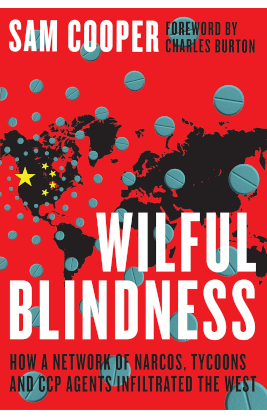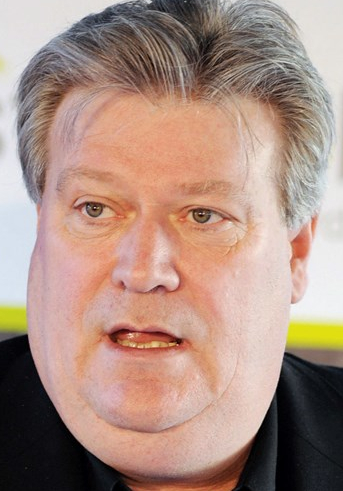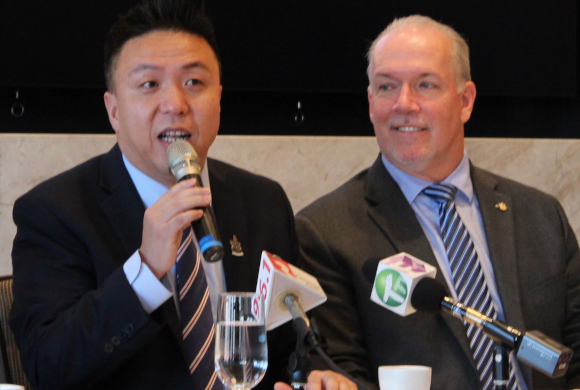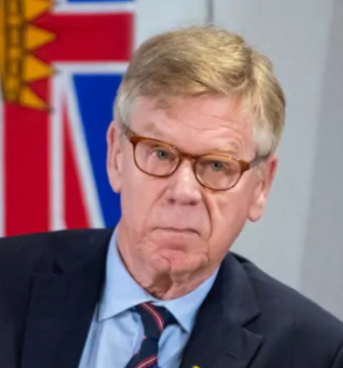Just how corrupt is B.C.?
It’s so bad that Sam Cooper will have to
update Wilful Blindness by about year-end
June 30, 2021
As a big fat bigshot with a big fat bellowing voice,
Rich Coleman could easily shout down the lone MLA
who dared to speak up. The rest of the BC Liberals’ pay/
perks/pension-craving cabinet could only look on in silence.
Imagine this scene, an exceedingly rare event for self-explanatory reasons. A British Columbia MLA at a cabinet meeting actually spoke out.
The story dates back to 2009. According to her friend Fred Pinnock, MLA Naomi Yamamoto told solicitor general Rich Coleman about large-scale crime linked to the government-owned casinos under his watch. Pinnock, a senior RCMP officer, didn’t know if his message to the minister had got through the bureaucracy’s gatekeepers. That message addressed the province’s decision to disband the Integrated Illegal Gaming Enforcement Team, especially so soon after the unit revealed damning evidence about casino money laundering.
Coleman responded furiously, Pinnock said. Yamamoto described the six-foot-four, fat ex-cop’s reaction as brutal, dismissive and embarrassing to her, Pinnock added.
Pinnock knew the feeling. As he related, he endured screaming by his own boss at a joint meeting of Mounties, IIGET and the Gaming Policy and Enforcement Branch that supposedly regulates casinos—and the screaming happened for exactly the same reason.
… his bosses didn’t care about public safety. They didn’t care about fighting organized crime, about gambling addicts, about murders, about kids tossed into cars at gunpoint, about thousands of heroin and fentanyl addicts dying in the Downtown Eastside, about money laundered into Vancouver’s glass towers.

Those are among the ramifications of B.C. currency washing as related in Sam Cooper’s recent exposé Wilful Blindness: How A Network of Narcos, Tycoons and CCP Agents Infiltrated the West.
It’s a problem that Canada neglects for multifarious reasons that include police incompetence, political correctness and political corruption. The network of Cooper’s title refers to the relationships (or “guanxi”) linking the Chinese Communist Party, triads and ultra-rich Chinese, sometimes associated with Iranian-backed narco-terrorists and Latino cartels, all pumping their money, drugs, influence and power into Western countries. Vancouver has proved to be their favourite port of entry.
The Yamamoto/Pinnock bollocking was just one of the ways B.C.’s establishment ignored, rationalized or openly supported widespread corruption. In one manner or another, the establishment shows its middle finger to anyone who questions its conduct.
That’s a lesson learned on this police accountability project, which sometimes struck me as a microcosm of the incomparably larger morass documented by Cooper. Since this is a cop accountability website, this article will focus on cop-related issues raised in Wilful Blindness. Admittedly, that’s a narrow focus that doesn’t do justice to the full scope of Cooper’s work.
He tells us of some good cops, like Pinnock, Barry Baxter, Robert Read and Calvin Chrustie, who hindered or wrecked their careers by taking a stand. Cooper also notes lots of bad cops and ex-cops, like former Mountie Coleman, his ex-Mountie flunky Rob Kroeker, ex-Mountie Larry Campbell and unnamed senior Mounties, all of whom look guilty of either omission or commission.
Then there’s Cameron “The Prince” Ortis, an extremely powerful civilian RCMP agent idolized by top Mountie Bob Paulson and arrested in 2019 on several espionage-related charges.
Marginalized whistleblowers aside, the cop approach was set by 1997 in reaction to Sidewinder, a two-year RCMP/CSIS study exposing Canada’s infiltration by an alliance of the Chinese government, Hong Kong tycoons and triads. “Those involved with the investigations were demoted, moved aside or ridden out of town by senior RCMP and CSIS team members,” Cooper states.
Worse than the cops, politicians almost consistently lack scruples. It’s not just BC Liberals like Coleman, Mike de Jong and the pay/perks/pension-craving nobodies who wouldn’t take a stand. Cooper’s book outs NDP criminals as well as provincial and federal Liberal backers.
Again, even from the much narrower perspective of a police accountability activist, it’s not surprising to see such esteemed establishment figures playing dirty.
John Horgan backs Burnaby Citizens Association councillor
James Wang’s 2017 candidacy for New Democrat MLA in
Vancouver-Langara: United Front fascism matters not to
B.C.’s establishment, and therefore the Cullen Commission.
There’s Richard Ching Chang, a Burnaby Citizens Association councillor/BC NDPer/loanshark who travelled to China with River Rock casino manager Rick Duff; the aforementioned Larry Campbell, the media-popular Vancouver mayor who was richly rewarded for his addiction-encouraging policies and casino support; current Burnaby Citizens Association councillor and 2017 BC NDP candidate James Wang, an operative for unsavoury Chinese interests including the fascist United Front movement; Lou Sekora, former Coquitlam mayor/Liberal MP/citizenship judge/Chinese dealmaker; and Carolyn Mulroney, ex-PM’s daughter, Ontario Conservative attorney general and VP of BloombergSen, a major shareholder of Great Canadian Gaming, the casino operator enjoying carte blanche in at least two provinces.
Whew! Let’s pause and take a breath before continuing:
Then there’s Richmond Liberal MP Joe Peschisolido, whose law office handled “millions of suspicious transactions” for overseas Chinese; Vancouver Liberal MP/cabinet minister Joyce Murray and her association with United Front manoeuvres; Justin Trudeau, whose family foundation received $1 million from a Chinese organization led by United Front official Bin Zhang; and Jean Chretien, “who since leaving office, has been at the CCP’s financial trough earning millions for himself and influencing Global Affairs in the public policy realm. Various Liberal Ministers and Global Affairs have shown a bias and written policy that is favourable to China and not to Canada.”
The list goes on, but B.C. NDP MLA David Eby gets credit for breaking his party’s muted response (notwithstanding concerns previously raised by NDP MLA Shane Simpson). After some initial backtracking, premier John Horgan appointed the narrowly focused Cullen Commission into money laundering.
NDP hopes of embarrassing the BC Liberals succeeded, especially with testimony from former BCL solicitors-general Coleman and Kash Heed. But the commission already looks like a typical B.C. establishment exercise with an establishment judge presiding over establishment lawyers massaging selected bits of info. That might be all Eby, now attorney general, wanted. God forbid the inquiry should scrutinize NDPers like Chang or Wang, or upset the federal Liberal party, the future home of so many ambitious provincial New Democrats.
Austin F. Cullen brings a lifetime of establishment
service to his commission of inquiry.
B.C. bigshots might lack Middle Kingdom sophistication, but they have guanxi of their own.
Getting back to the much less important topic of police accountability, it was another public inquiry by another judge, Wally Oppal in the 1990s, that stuck us with B.C.’s Office of the Police Complaint Commissioner and its 20 years of corruption. If that wasn’t what Oppal had in mind, he’s never said so publicly.
Apart from the establishment-run Cullen Commission, we have establishment media coverage. Postmedia’s Ian Mulgrew has dismissed testimony from Pinnock and Baxter while scoffing at “Yellow Peril” fears. Luckily for us, Hitler’s Nazis were white.
It’s from Cooper that we get a much broader and credible indictment of a wide-ranging problem. Yet his work might not get the attention it deserves. All the circumstances that allowed Chinese money, drugs and power into Canada—political correctness, political corruption, establishment conformity—can undermine Cooper’s revelations. He might also face jealousy from B.C.’s mice-in-a-maze media. The former Vancouver Province/Sun reporter now works for Global News in Ottawa. With Jonathan Manthorpe no longer on staff and Terry Glavin contributing remotely, that leaves Douglas Todd as very much an outsider in the smug, stifling little world of Vancouver Postmedia.
Uniformly conformist, other B.C. journalists are much the same.
In a wider context, corruption has long flourished in Vancouver. The former Vancouver Stock Exchange held international notoriety as the “scam capital of the world” and the city probably retains the planet’s highest concentration of really dumb penny stock promos. Much more dangerously, B.C.’s ever-expanding poverty pimp industry presents an entirely new style of corruption, combining destructive public policies, grasping opportunism and nauseating hypocrisy. With the support of almost everyone in local politics and media, the B.C. industry seems to be, at least proportionally, the world’s largest.
Some problems with this book must be acknowledged. They include shit writing, typical for a journalist but inexcusable for a publisher.
Another journalistic fault is Cooper’s hubristic passion for the first-person singular. But at least that primes the book for one hilarious line: “As reporters, we never want to become part of the story.”
The book’s organization is a mess. The sequence lurches back and forth with abandon.
Cooper must be wrong in suggesting RCMP brass evaded the money laundering problem circa 2012 due to contract renewal negotiations with the province. Cooper thinks Mountie vigilance might have pushed the BC Liberals into replacing the RCMP with a new provincial force. But the headaches caused by Surrey’s transition to a municipal force just hint at the challenge of establishing a B.C.-wide cop outfit. Moreover the incorrigibly troublesome, downright weird nature of cop culture must make B.C. politicians appreciate the advantage of offloading so many police imbroglios on Ottawa.
The most curious aspect of the book, however, is the timing of its publication. Wilful Blindness came out within days of Cullen wrapping up his hearings, but about seven months before his report’s due. Could the timing be an effort to influence Cullen with evidence that his process ignored or downplayed? Certainly there’s an awful lot more to learn from Cooper’s work than from the commission hearings.
That should make Wilful Blindness ready for an update by year-end. Or else Cooper could write a separate, but equally thorough response to Cullen’s report.
That response may well have to be a rebuttal.
Read about B.C.’s Office of the Police Complaint Commissioner
Go to News and Comment page


